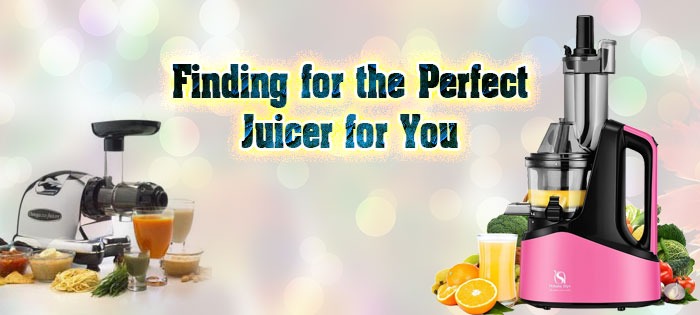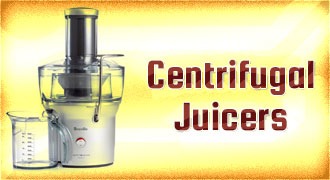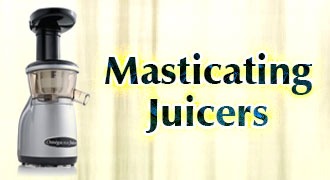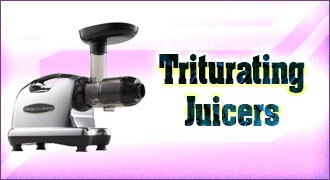Juicing has become an essential kitchen activity for the health-conscious people or even for those who just want to have a yummy, natural juice every day. But before you set out to buy your personal juicer, you should familiarize yourself with the main types of juicers and how they differ from each other. Knowing this information will give you an overview of important factors such as how you want to use your juicer, what type of produce you want to use for juicing, or even how long the juice will stay fresh.
Here are the different types of juicers along with their pros and cons. As you read along, please bear in mind what particular features and functions you want to have in a juicer.
 Centrifugal juicers
Centrifugal juicers
Centrifugal juicers are the most popular and typically the most affordable among all the electric juicers. A centrifugal juicer breaks down the produce using a flat cutting blade, just like a blender’s. The blade’s rotating speed runs up to 3,000 to 16,000 revolutions per minute (RPM), which is pretty fast. It has strainer basket with tiny holes where the juice passes through to a container at the bottom while leaving the dried pulp behind.
Pros :
- It is available at most department stores.
- It is not as expensive and may be a good option for beginners.
- It is easy to use.
- It works fast and helps you save time and effort.
Cons :
- It can be a bit too noisy especially if it runs at high speed.
- The high-speed spinning results to oxidation of the juice which means you also need to consume it right away.
- It is not effective for juicing leafy, hard, or fibrous produce.
 Masticating juicers (slow juicers)
Masticating juicers (slow juicers)
Masticating juicers are also known as single-gear juicers or slow juicers. It features a single gear or an auger that does the chopping and grinding of the produce and squeezes them through a stainless steel screen. This process allows the juicer to break down the more fibrous parts of fresh produce to release its nutrients and enzymes.
Unlike the centrifugal juicer, the masticating juicer has a much lower speed, thus producing minimal heat which causes the oxidation and eventual loss of natural nutrients of the produce being juiced. The result? Most of the vital enzymes and nutrients are very much intact in your juice.
Pros :
- It operates more quietly compared to the centrifugal juicer.
- Extracted juice is stable and can be stored in the fridge for up to 24 hours, so you can prepare your juice ahead of time.
- The juice you get is of high quality. The results are a very rich and concentrated taste.
- It can juice leafy vegetables and other fibrous produce including wheatgrass and herbs.
Cons :
- It is a more pricey than centrifugal juicers.
- It can be heavy and a bit bulky.
 Triturating juicers (twin gear)
Triturating juicers (twin gear)
Also known as “twin gear juicers,” triturating juicers are considered top-of-the-line among mainstream juicing machines. It has two gears that counter-rotate at a slow speed, chopping up and grinding fruits and vegetables to extract their juice. Since triturating juicers run at a very low speed, they generate little to no friction or heat. Thus, these juicers ensure thorough juicing of all produce and at the same time prevents the air from getting “locked” in the juice (which causes oxidation).
This action breaks the produce’s cell membranes open and releases its nutrients, minerals, and enzymes. It also breaks down the amounts of phytochemicals from the produce, resulting in a juice which not only looks rich, but is also actually rich in vitamins and minerals.
Pros :
- It operates noiselessly.
- Extracted juice is stable and can be stored in the fridge for up to 36 hours..
- It squeezes every drop of juice from the fruits and vegetables, producing a high-yielding juice and leaving a very dry pulp behind.
- It can juice hard, leafy and fibrous produce including wheatgrass and herbs.
Cons :
- It is very pricey and may not be suitable for beginners due to its complexity.
- Processing hard or fibrous produce may become bit of a challenge and require some more effort (unlike in a single-gear juicer).
- It can be heavy, weighing around (13 to 26 pounds or 6-12 kilograms).
Now, you know what the available types of juicers are on the market as well as their functions. To help you decide which one is the best juicer for you, you may want to refer to juicer reviews written by the consumers themselves. You may also want to compare several juicer deals and juicer discounts especially if you’re on a budget. Happy juicing, everyone!




 Masticating juicers (slow juicers)
Masticating juicers (slow juicers) Triturating juicers (twin gear)
Triturating juicers (twin gear)